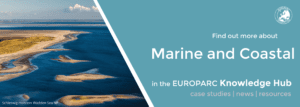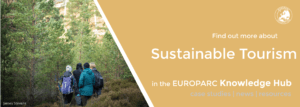Next webinar: Outdoor Sports – Engaging with or using nature?
EUROPARC’s next webinar will take place on the 27th of April at 11:00 CET. It will look at opportunities and challenges presented to Protected Areas by increasing outdoor sports practice. You can sign up here (it’s free!).
Outdoor Sports and Nature
The connection between outdoor sports and nature seems to be an obvious one, and indeed, through the pandemic more than ever people are drawn to the outdoors. However, just because activities are practiced outside, does not necessarily mean that they are done in harmony with nature.
In some cases, outdoor sports practice can pose additional stress on already fragile habitats and sensitive species.
Protected Areas managers are therefore confronted with the task of minimising the impact of outdoor sports on local fauna and flora, and at the same time, welcoming sport practitioners and other visitors so that more people can enjoy the recognised benefits of Health Enhancing Physical Activity in the outdoors.
Sign up for the webinar here!
In this webinar, we will have the opportunity to hear from Lissa Breugelmans, an avid cyclist, with a Masters in Biology who can share a unique perspective as an outdoor enthusiast and practitioner, who understands the current impacts outdoor activities have on nature.
We will also learn from Daniele Piazza, director of the Dell’Ossola Protected Area about an integrated strategy – involving many different local stakeholders, to minimise and mitigate the effects of outdoor sports in this alpine nature park.
Myles Farnbank, from Wilderness Scotland, will present the Adventure Travel Guide Standard, a useful tool to institutions, sustainable destinations and training programs, in order to build the capacity of the Outdoor sport sector on the three core responsibilities all trainers should have: Sustainability, Safety, and Quality and Meaning.
Webinar programme
Welcome and introduction to the webinar
By Carol Ritchie, EUROPARC Federation
Dilemmas for an outdoor enthusiast
By Lissa Breugelmans, Outdoor sports practitioner and employed biologist at an ecological study bureau
The RESICETS project – Park and Outdoor Sports working together to minimise the impact of outdoor activities on wildlife
By Daniele Piazza, director of the Aree Protette dell’Ossola
The Adventure Travel Guide Standard- Showing how the Outdoor Sports sectors values nature though sustainability standards
By Myles Farnbank, Wilderness Scotland guide, fellow of The Royal Geographical Society and a Master Educator of Leave No Trace
The SEE project. Researching the issues and finding best practice
By Mike McClure, Outdoor Recreation Development Officer, Sport Northern Ireland
Let’s talk about it! All participants will have the opportunity to exchange on the topics discussed and/or to ask questions.
Final remarks and Close
By Noel Doyle, Leave No Trace Ireland
The webinar will last approximately 1h 30min and it will be hosted in English. We welcome participants from all across the network and beyond.
Get to know the case study presenters

Lissa Breugelmans
She is a trained ecologist currently working in sustainable forestry, Nature is not only her research subject and office – it’s also her favourite playground. She loves packing her bike with a few essentials and getting out there, enjoying moving through incredible landscapes and admiring biodiversity. She believes recreational outdoor users and nature protectioners share an awe for the natural world, and can be allies instead of opponents when it comes to preserving it.

Daniele Piazza
Agronomist, with more than 15 years’ experience in Natura 2000 management, planning, environmental assessment and project management both as freelance consultant and civil servant. During the last years he has been involved also in social innovation projects in marginal rural areas, with a focus on the western alpine communities. Since March 2020, he is in charge of the overall and day-to-day management of the Protected Areas of Ossola Management Body.
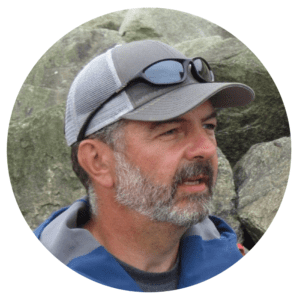
Myles Farnbank
Myles is an adventure guide, trainer and consultant with more than 30 years of leading clients in many of the world’s wildest places. He has been a lecturer on undergraduate programmes in Adventure Tourism and Marine & Coastal Tourism and a Masters in Ecotourism. He has had a major role in the creation of The Adventure Travel Guide Standard (ATGS) and lead the team writing the Sustainability section in the 2nd Edition published in Feb 2021.
The SEE project: Training for a more sustainable, respectful and enjoyable outdoor sport experience
This webinar will publicly launch the ERASMUS+ SEE project, in which EUROPARC is one of the partners. Led by Leave No Trace Ireland, ‘SEE’ stands for Sustainability and Environmental Education in Outdoor Sports. The project aims to tackle the un-coordinated approach to the teaching and communication of environmental ethics in the spheres of outdoor sport and recreation.
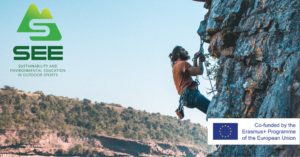
The SEE project is ultimately about ensuring that outdoor sports are managed sustainably and responsibly in nature, which should enable Protected Areas to build greater confidence and trust to allow increased participation so that more people can enjoy the benefits of outdoor sports.

The role of Local and Regional Authorities in protecting the marine environment
Source: Adobe Stock
The EUROPARC Federation, along with other stakeholders, has been invited to discuss challenges and opportunities related to protection of the marine environment at the subnational level. In this article, you will find a summary of the discussed points.
Subnational authorities protecting the marine environment
The European Committee of the Regions (CoR) is currently drafting an opinion on the role of Local and Regional Authorities in protecting the marine environment. The local and regional (subnational) dimension of the Marine Strategy Framework Directive hasn’t received enough attention yet.
Moving forward with this unexplored dimension could accelerate the ambitious task to tackle the challenges highlighted in the report on the first implementation cycle of the Marine Strategy Framework Directive, published by the European Commission in June 2020.
The challenges mentioned in the report are mainly connected with the CoR’s work on the European Green Deal, specifically its environmental component, which is strategic for the post-COVID-19 green and digital recovery. A recent report from the Court of Auditors also shows that biodiversity loss continues, and points to the possibility to increase the potential of EU funding for marine conservation objectives.
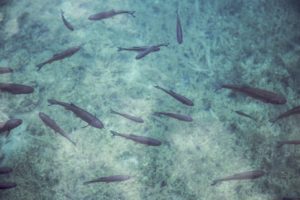
Sea floor with fish. Photo: Pixabay
The rapporteur for this opinion, Ms Emma NOHRÈN (SE/Greens) invited EUROPARC and other stakeholders to discuss the most important challenges and opportunities at the subnational level, related to protection of the marine environment.
During the debate, EUROPARC stressed the role of marine Protected Areas, and underlined the following points:
- The importance to recognize the role of Marine Protected Areas in the local plans for marine environment protection and local development.
- The necessity to guarantee adequate political attention, budget, human resources and skills to the Marine Protected Areas, not only to achieve the 30% target planned in the new EU Biodiversity Strategy, but especially to reach a good and efficient management.
- The importance of coordination between local, regional and national authorities in charge of marine topics.
- At each level, the importance of coordination between the different authorities in charge of environment, fishery, transport, but also of defense (Navy) if pertinent at the regional level, and so on.
- The need of coherence of policies in the land and in the sea, because what happens in the land (for example agricultural practices) has a decisive impact on the sea. Therefore, a coordination with Farm to Fork Strategy (also but not only for the sea food) and CAP, is essential.
- If in charge of a Marine Protected Area, the local authority has to guarantee adequate attention and priority to the Marine Area in relation to its different policies and responsibilities.
- In all cases, even if not directly involved in the management of Marine Protected Areas, local and regional authorities are crucial in establishing good and long-term relation with local communities and stakeholders, as fishermen and tourism business.
- In order to guarantee involvement of the private sector, for example, the local and regional authorities have to take clear and long term political decisions. These decisions should result in a stable framework for the private sector to decide how and when to make investments and in which direction they should drive their enterprises.
- Partnerships with local stakeholders can be supported by local authorities, with focus on dialogue and implementation of win-win solutions. For example, local and regional authorities can provide specific recognitions to fishermen that work in a sustainable way and in cooperation with the Marine Protected Areas. The same can be done for the tourism business (EUROPARC promotes for example the Charter for Sustainable Tourism in Protected areas, that awards Protected Areas and their private partners).
Find more information about the event here!
The Draft Opinion (pre-vote) in all EU languages is available here. At the same link, from May 25th, it will be possible to download in all EU languages the final version (post-vote in CoR Plenary) of the Opinion, which will provide the formal position of the CoR on marine protection by subnational authorities.
Biosphere Reserves in Germany
The Schwäbische Alb Biosphere Reserve: location of the 2011 EUROPARC Conference © EUROPARC Nordic Baltic Section
Biosphere reserves around the world and across Europe create a powerful network of fascinating landscapes and valuable ecosystems. Read about biosphere reserves in Germany in a new publication by Nationale Naturlandschaften e.V.
New publication: Biosphere reserves in Germany
German biosphere reserves are home to a great diversity of habitats with a varied range of animal and plant species. In a new publication “Biosphere reserves in Germany“, the Nationale Naturlandschaften (formerly known as EUROPARC Germany) presents the diversity of Germany’s 16 biosphere reserves and their role for people.
Contributing to regional values through sustainable tourism, providing jobs in rural regions, offering space for leisure and recreation, are just some examples of why biosphere reserves deserve more of our attention.
Download the publication here!
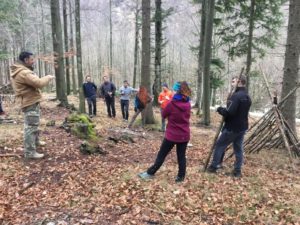
Bush craft workshop organised in the Julian Prealps MAB reserve. Photo: Julian Prealps
What are biosphere reserves?
Biosphere reserves are areas of land and coastal ecosystems promoting solutions to reconcile biodiversity conservation with its sustainable use. They are internationally recognized and nominated by national governments. Simply put, biosphere reserves are “living laboratories that boost nature-based solutions for sustainable development“.
They are sites for testing interdisciplinary approaches to understanding and managing changes and interactions between social and ecological systems, including conflict prevention and management of biodiversity.
Biosphere Reserves are designated under the intergovernmental Man and the Biosphere (MAB) Programme, a scientific programme created by UNESCO, that aims to establish a scientific basis for enhancing the relationship between people and their environments.
MAB Programme celebrates 50 years!
UNESCO’s Man and the Biosphere Programme was created in 1971 with a vision to promote sustainable connection between people and nature. As it evolved, the idea materialised in the designation of biosphere reserves.
Currently, the World Network of Biosphere Reserves counts 714 sites in 129 countries all over the world, including 21 transboundary sites. We are proud to represent a number of MAB Reserves in Europe, who are also members of the EUROPARC Federation.
Check the opportunities to get involved in the celebrations of 50 years of MAB, and to pay tribute to the common thread among humanity and nature!
COVID-19 takes a heavy toll on Protected Areas and nature conservation
Protected Area rangers play an essential role in nature conservation and environmental education. Photo: Kullaberg Nature Reserve
Consequences of the pandemic pose severe threats to Protected Areas and nature conservation efforts around the world. This gloomy conclusion results from a series of new research papers and articles published last week by IUCN.
The COVID-19 pandemic and its economic consequences have caused job losses among Protected Areas rangers, cuts in environmental protection funding and collapse in ecotourism around the globe. Needless to say, these setbacks could undermine global efforts to halt biodiversity loss and climate change.
Dr Bruno Oberle, IUCN Director General commented:
While the global health crisis remains priority, this new research reveals just how severe a toll the COVID-19 pandemic has taken on conservation efforts and on communities dedicated to protecting nature.
Published in a special issue of PARKS – the journal of the IUCN World Commission on Protected Areas, a collection of new studies and articles analysed the impacts of the pandemic on Protected Area operations. The publication also examined implications for recently adopted environmental policies, and how they are reflected in economic recovery packages and other governmental policies.
Budget cuts and collapse in tourism revenue
According to the IUCN synthesis, conservation efforts were most severely hit in Africa and Asia. More than half of Protected Areas in Africa, and about a quarter in Asia, reported that they had to halt or reduce field patrols and anti-poaching operations, as well as environmental education activities.
The pandemic was also a hard blow for the livelihoods of rangers and their communities. A survey of rangers in more than 60 countries found that more than one in four rangers had seen their salary reduced or delayed, while 20% said that they had lost their jobs due to the pandemic-related budget cuts.
What is the situation in Europe?
Despite closures and losses of tourism revenue, most Protected Areas in Europe maintained their core conservation operations. The surveys also show that European rangers weren’t affected as strongly as their peers from Central America and the Caribbean, South America, Africa and Asia.
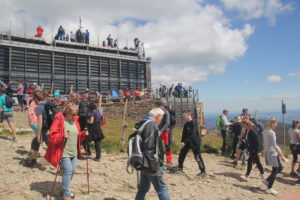
Overcrowding of Europe’s Protected Areas posed serious issues during the first COVID wave. Photo: Jakub Kaspar
However, European Protected Areas have also met significant challenges arising from the COVID-19 pandemic. A study by FIDELIO research project found that impacts of COVID-19 and their policy implications put unexpected pressure on the parks and their staff, which naturally generated pleas for more support. These new challenges were mainly connected to overcrowding, new profile of visitors, their problematic behavior and conflicts between different groups.
COVID-19 and environmental policy
To also shed light on the impacts of the pandemic on environmental policy, the report analysed economic recovery packages and other government policies that were implemented or advanced in 2020. The experts identified some positive examples explicitly benefitting Protected Areas or scaling up environmental protection. For example, eight EU countries have set aside funding to expand or better manage Protected Areas, natural capital and the circular economy.
While 17 countries have maintained or increased their support for Protected Areas, 22 countries have on the contrary rolled back their environmental protection. In some cases, governments have even considered proposals to allow mining and fossil fuel extraction in Protected Areas. Mentioned in the report are for example proposals by the Brazilian government to allow mining and fossil fuel extraction in indigenous reserves, new permits in Russia to allow deforestation for transport and infrastructure in natural areas, and plans to explore and drill for oil and gas in the US Arctic.
Knowing the importance of healthy and protected nature, EUROPARC stands by all the affected Protected Areas and their rangers around the world. As expressed by Carlos Manuel Rodríguez, head of the Global Environment Facility:
We cannot say we are building back better unless we do so whilst also protecting the natural world.
As we might be slowly emerging out of the crisis with available vaccination, the time to design a better future is now. And if we want to build back better, the recovery needs to include a better protection of rangers and their livelihoods around the world, societies and nature resistant to climate change, and a more sustainable tourism sector.
Read about Sustainable Tourism and the European Charter for Sustainable Tourism in Protected Areas!
